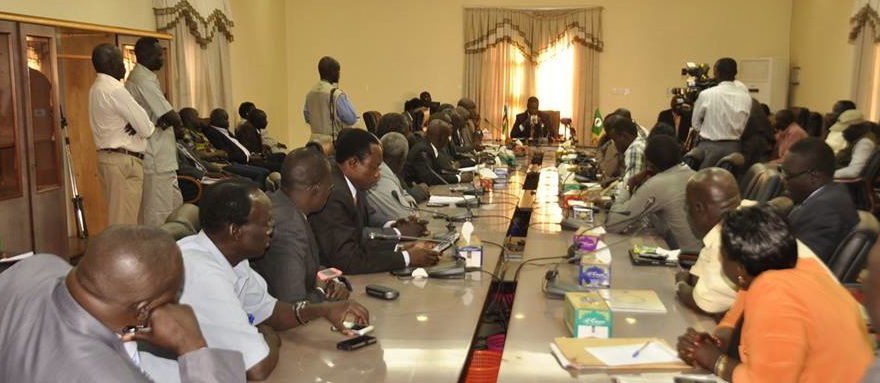The governors of Central and Western Equatoria have vowed to continue advocating for federalism, after efforts to silence debate on the issue in the Juba media. They have described federalism as a ‘demand’ of the Equatorian people.
Federalism is a system of government in which state or regional governments hold their own exclusive powers, which the national government cannot interfere with.
South Sudan’s national government currently has wide-ranging powers over state governments including the ability to appoint and remove officials, direct spending, and set nationwide policies.
A federal system would devolve powers from the current national government.
Speaking to the press and to his own cabinet on Thursday morning at the State Secretariat in Juba, Central Equatoria Governor Clement Wani Konga said, “We are for federalism, and still we shall continue to talk about federalism.”
This comes after high tensions between the governor and the president, who is reported to have considered removing the three governors of Equatoria by decree, owing to their advocacy for federalism.
Last week the presidential press secretary revealed in an interview with Bakhita Radio that President Salva Kiir wants politicians of the Equatoria region to stop advocating for federalism and instead work for peace first.
Following these remarks, directives were passed by the National Security Service to various media houses to stop covering the federalism issue, according to the Editors Forum, a group of editors representing various newspapers and radio stations.
Kiir’s information minister on Tuesday denied that the government banned discussion of federalism, but on the following day the National Security Service confiscated the print run of Juba Monitor newspaper over coverage of the issue.
Minister of Information Michael Makuei Lueth then told the state-owned SSTV that federalism “should not be discussed outside the National Constitutional Review Commission.”
But the Central Equatoria governor says he discussed this with President Kiir, along with the other Equatorian governors: “We asked the president questions that do you want the rebels to [advocate] for federalism and you don’t want democratic discussion to take place within.”
“Federalism has to be discussed so that it will put in the permanent constitution,” he said.
“As governors of Equatoria, we did not initiate the issue of federalism; it was an issue which was raised from the floor during the Equatoria Conferences,” he said. “In all the four [Equatoria] conferences federalism was talked of, and the resolutions were handed over to the President of the Republic.”
These comments echo remarks made by Governor Joseph Bakosoro of Western Equatoria State earlier this week. While visiting the capital Juba he urged media to continue covering debate on federalism.
“Let people feel free to talk, nobody should stop anybody from discussing his or her interest – I think it will be an illusion for anybody to warn us don’t talk of anything as long as that person is taking under the constitution which is the law,” said Bakosoro.
The visiting governor said that people must be given freedom of expression to express their desire for what they want.
He said it is not a crime to ask for federalism.
But he also pointed out federalism was not a demand to be made by force, clarifying that it should be a peaceful discussion.
‘Censor the incident of 15th December’
Governor Clement Wani Konga also referred to ‘censorship’ of the events that began on 15 December in Juba, in which hundreds of people were killed in the streets and neighborhoods of Juba.
He referred to efforts by unnamed interests to “censor the incident of 15th December 2013, proving that Riek Machar is correct, that our president is a dictator – but as far as I know he is not. So within reason we have to fight it back so that we maintain our government, we maintain our elected president till his term is over.”
He did not elaborate further on what he thought was being censored. This may have been a reference to the question of whether or not there was an attempted coup d’etat – a claim made by Salva Kiir but rejected by SPLM/A-IO and SPLM Leaders.
Or, he may have been referring to the impunity for soldiers who committed crimes during those days. In the same speech he said, “In Juba, Equatoirians died because they were accused of harboring Nuer.”
‘Ten states have to remain as they are’
Governors of the three Equatoria States have not yet specified in detail the constitutional terms that they are planning for when they refer to ‘federalism.’
But yesterday the Central Equatoria governor clarified that he meant a system of federal states, not federal regions. He said there should be “no return to the regions – the ten states have to remain as they are.”
This was a reference to the three provinces of Equatoria, Bahr al Ghazal and Upper Nile, which had regional governments in the 1970s, with capitals in Juba, Malakal and Wau.
Konga and Bakosoro both have also tried to ease fears that their advocacy for federalism is a throwback to ‘kokora’, a movement of Equatorian particularism that gained prominence in the 1970s prior to the start of the second Sudanese civil war.
In recent remarks, Bakosoro dismissed rumors that he would evict Dinka citizens from his state, saying “In Western Equatoria, they went further and saying that I am going to chase all the Dinka community… nobody is chasing anybody anywhere.”
Photo: Governor Clement Wani Konga speaking to his own cabinet as well as press in Juba, 3 July 2014 (Radio Tamazuj)
Related coverage:
Politics: Kiir wants Equatorians to stop advocating for federalism (23 June)
C. Equatoria governor: ‘We stand for federalism’ (5 June)




